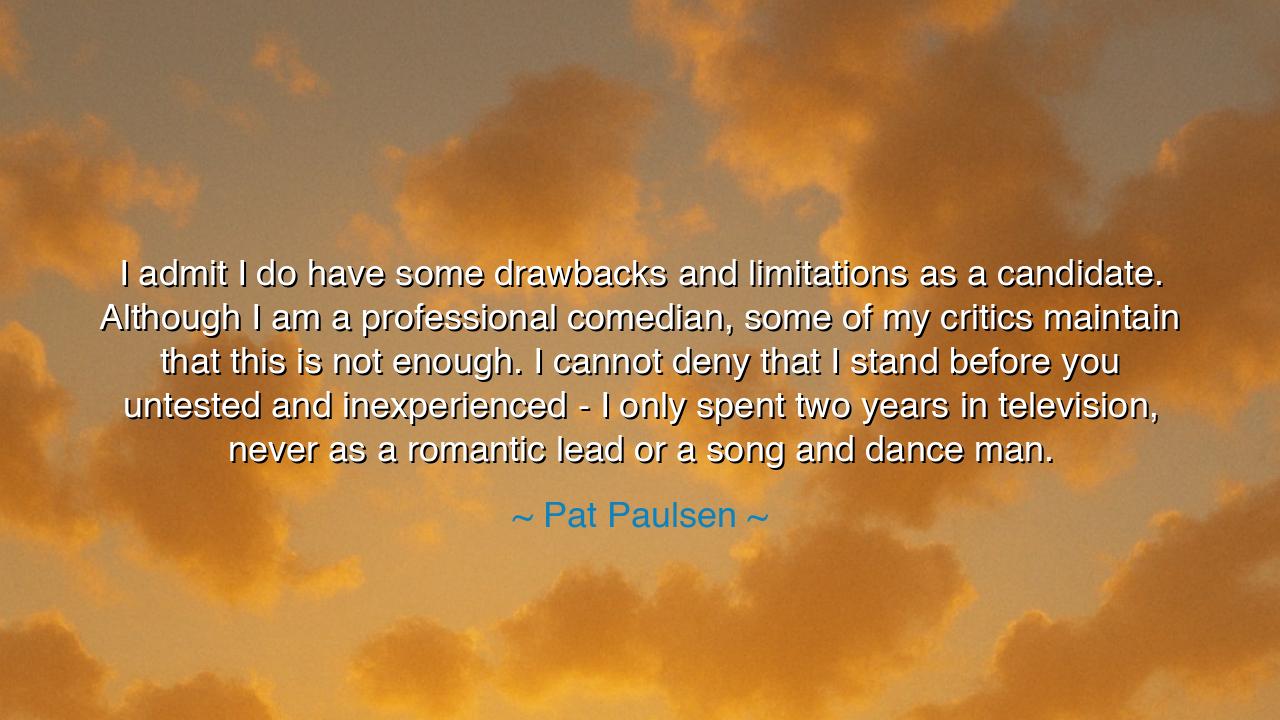
I admit I do have some drawbacks and limitations as a candidate.
I admit I do have some drawbacks and limitations as a candidate. Although I am a professional comedian, some of my critics maintain that this is not enough. I cannot deny that I stand before you untested and inexperienced - I only spent two years in television, never as a romantic lead or a song and dance man.






Hear the voice of Pat Paulsen, the satirical prophet clothed in humor, who declared: “I admit I do have some drawbacks and limitations as a candidate. Although I am a professional comedian, some of my critics maintain that this is not enough. I cannot deny that I stand before you untested and inexperienced—I only spent two years in television, never as a romantic lead or a song and dance man.” In these words, he wove jest and truth together, for though they were spoken in laughter, they reveal the absurdity of politics and the strange theatre of public life.
Paulsen, known as a satirist, often ran mock campaigns for the presidency of the United States during the late 1960s and beyond. His humor was a mirror held up to society, reflecting not only the flaws of the candidates of his time but also the expectations of the people. With irony, he confessed his supposed weakness—not that he lacked wisdom or conviction, but that he lacked the glamour of a romantic lead or the charm of a song and dance man. Herein lies the sting: politics, meant to be the realm of vision and integrity, had become a stage where charisma often outweighed substance.
The comedian has always been a dangerous figure, for through jest he can speak truths too sharp to be spoken plainly. In ancient courts, the jester mocked kings, yet often revealed wisdom that none else dared utter. So too did Paulsen, in his “candidacy,” expose the foolishness of expecting leaders to be actors, entertainers, or flawless heroes. By declaring his own limitations, he pointed out the absurdity of the public’s illusions—that perhaps what people seek is not wisdom, but performance.
History has seen this paradox often. Cicero, the great Roman orator, warned that the people would often choose not the most capable leader, but the one who spoke most beautifully or looked most noble. The fate of Rome itself bore witness to this truth, as demagogues charmed the masses with spectacle, while corruption ate at the foundations of the Republic. Paulsen’s mockery echoes these warnings: that a leader is judged too often as if he were an actor upon a stage, rather than a steward of justice.
And yet, Paulsen also humbles himself, speaking of his lack of experience. Here he teaches another lesson: that laughter can cloak vulnerability, that even jest can admit truth. Leaders, whether real or satirical, must face the reality of their own drawbacks. To acknowledge weakness is not disgrace but wisdom, for it is only through honesty that trust can be earned. In contrast, the leaders who deny all fault become dangerous, for they bind themselves to illusion rather than truth.
Thus his humorous confession, though playful, becomes a heroic act of satire. By standing before the people as “untested and inexperienced,” he becomes more truthful than those who boast falsely of greatness. By declaring that he has never been a romantic lead or a song and dance man, he unmasks the lie that leadership must also be spectacle. He teaches us to see through the masks of performance, to seek substance beneath the glitter.
Therefore, children of tomorrow, learn from Paulsen’s jest. Do not confuse the charisma of a performer with the wisdom of a leader. Do not let yourselves be ruled by the theatre of politics, where applause often drowns out truth. Instead, honor those who admit their limitations, who confess their flaws, for such honesty is rarer and more precious than a thousand promises.
Thus Pat Paulsen’s laughter becomes timeless counsel: satire is a weapon sharper than a sword, exposing folly with mirth. And though he claimed never to be a romantic lead or a song and dance man, he played the noblest role of all—the truth-teller, who through humor reminds us what leadership truly ought to be.






AAdministratorAdministrator
Welcome, honored guests. Please leave a comment, we will respond soon